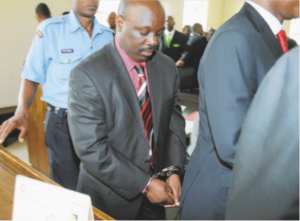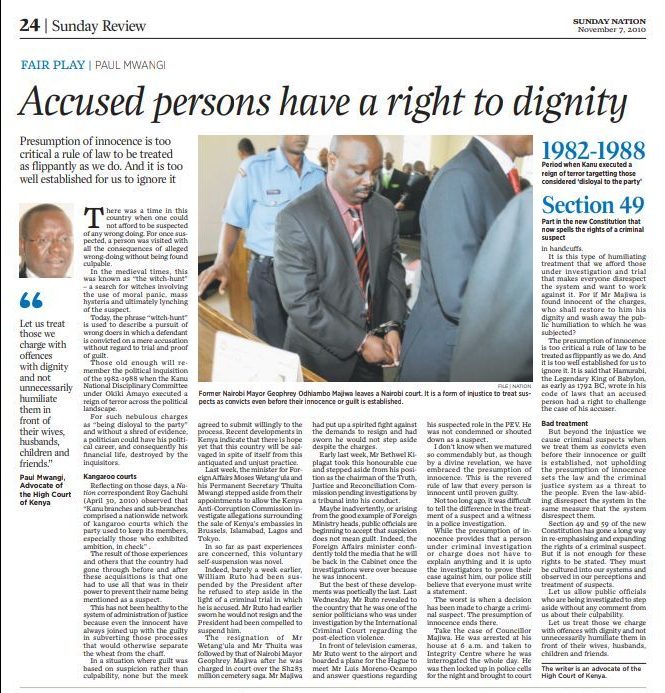Presumption of innocence is too critical a rule of law to be treated as flippantly as we do. And it is too well established for us to ignore it.
There was a time in this country when one could not afford to be suspected of any wrongdoing. For once suspected, a person was visited with all the consequences of alleged wrong-doing without being found culpable. In the medieval times, this was known as “the witch-hunt” – a search for witches involving the use of moral panic, mass hysteria and ultimately lynching of the suspect. Today, the phrase “witch-hunt” is used to describe a pursuit of wrongdoers in which a defendant is convicted on a mere accusation without regard to trial and proof of guilt.
Those old enough will remember the political inquisition of the 1982-1988 when the Kanu National Disciplinary Committee under Okiki Amayo executed a reign of terror across the political landscape. For such nebulous charges as “being disloyal to the party” and without a shred of evidence, a politician could have his political career, and consequently his financial life, destroyed by the
inquisitors.

Kangaroo courts
Reflecting on those days, a Nation correspondent Roy Gachuhi (April 30, 2010) observed that “Kanu branches and sub-branches comprised a nationwide network of kangaroo courts which the party used to keep its members, especially those who exhibited ambition, in check”. The result of those experiences and others that the country had gone through before and after these acquisitions is that one had to use all that was in their power to prevent their name being mentioned as a suspect.
This has not been healthy to the system of administration of justice because even the innocent have always joined up with the guilty in subverting those processes that would otherwise separate the wheat from the chaff.
In a situation where guilt was based on suspicion rather than culpability, none but the meek agreed to submit willingly to the process. Recent developments in Kenya indicate that there is hope yet that this country will be salvaged in spite of itself from this antiquated and unjust practice.
Former Nairobi Mayor Geophrey Odhiambo Majiwa leaves a Nairobi court. It is a form of injustice to treat suspects as convicts even before their innocence or guilt is established.
1982-1988
Period when Kanu executed a
reign of terror targetting those
considered ‘disloyal to the party’
Section 49
Part in the new Constitution that
now spells the rights of a criminal
suspect.
Last week, the Minister for Foreign Affairs Moses Wetangula and his Permanent Secretary Thuita Mwangi stepped aside from their appointments to allow the Kenya Anti-Corruption Commission investigate allegations surrounding the sale of Kenya’s Embassies in Brussels, Islamabad, Lagos and Tokyo. In so far as past experiences are concerned, this voluntary self-suspension was novel.
Indeed, barely a week earlier, William Ruto had been suspended by the President after he refused to step aside in the light of a criminal trial in which he is accused. Mr. Ruto had earlier sworn he would not resign and the President had been compelled to suspend him.
The resignation of Mr. Wetang’ula and Mr. Thuita was followed by that of Nairobi Mayor Geophrey Majiwa after he was charged in court over the Sh283 million cemetery saga. Mr. Majiwa
had put up a spirited fight against the demands to resign and had sworn he would not step aside despite the charges. Early last week, Mr. Bethwel Kiplagat took this honourable cue and stepped aside from his position as the Chairman of the Truth, Justice and Reconciliation Commission pending investigations by a tribunal into his conduct.
Maybe inadvertently, or arising from the good example of Foreign Ministry heads, public officials are beginning to accept that suspicion does not mean guilt. Indeed, the Foreign Affairs Minister confidently told the media that he will be back in the Cabinet once the investigations were over because he was innocent.
But the best of these developments was poetically the last. Last Wednesday, Mr. Ruto revealed to the country that he was one of the senior politicians who was under investigation by the International Criminal Court regarding the post-election violence.
In front of television cameras, Mr. Ruto went to the airport and boarded a plane for the Hague to meet Mr. Luis Moreno-Ocampo and answer questions regarding his suspected role in the PEV. He was not condemned or shouted down as a suspect. I don’t know when we matured so commendably but, as though by a divine revelation, we have embraced the presumption of
innocence. This is the revered rule of law that every person is innocent until proven guilty.
Not too long ago, it was difficult to tell the difference in the treatment of a suspect and a witness in a police investigation. While the presumption of innocence provides that a person
under criminal investigation or charge does not have to explain anything and it is upto the investigators to prove their case against him, our police still believe that everyone must write
a statement.
The worst is when a decision has been made to charge a criminal suspect. The presumption of innocence ends there. Take the case of Councillor Majiwa. He was arrested at his house at 6 a.m. and taken to Integrity Centre where he was interrogated the whole day. He was then locked up in police cells for the night and brought to court Every Thursday in handcuffs. It is this type of humiliating treatment that we afford those under investigation and trial that makes everyone disrespect the system and want to work against it. For if Mr. Majiwa is found innocent of the charges, who shall restore to him his dignity and wash away the public humiliation to which he was subjected?
The presumption of innocence is too critical a rule of law to be treated as flippantly as we do. And it is too well established for us to ignore it. It is said that Hamurabi, the Legendary King of Babylon, as early as 1792 BC, wrote in his code of laws that an accused person had a right to challenge the case of his accuser.
Bad treatment
But beyond the injustice we cause criminal suspects when we treat them as convicts even before their innocence or guilt is established, not upholding the presumption of innocence sets the law and the criminal justice system as a threat to the people. Even the law-abiding disrespect the system in the same measure that the system disrespect them.
Section 49 and 59 of the new Constitution has gone a long way in re-emphasising and expanding the rights of a criminal suspect. But it is not enough for these rights to be stated. They must be cultured into our systems and observed in our perceptions and treatment of suspects.
Let us allow public officials who are being investigated to step aside without any comment from us about their culpability. Let us treat those we charge with offences with dignity and not unnecessarily humiliate them in front of their wives, husbands, children and friends.
The writer is an advocate of the High Court of Kenya.




